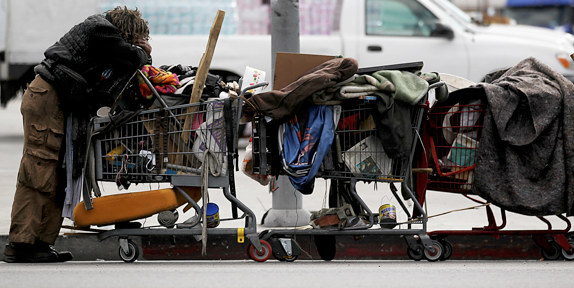CommentsLA WATCHDOG--In late February, the City indicated that it was investigating a ballot measure that would authorize a new tax, fee, or bond offering to fund the City’s homeless plans that are estimated to cost $1.85 billion over the next ten years.
On March 9, the County’s Chief Executive Officer issued a report outlining five alternatives to create a dedicated source of revenue to fund its Homeless Initiative. These included a parcel tax on the County’s 2.4 million properties, a tax on medicinal and recreational marijuana, an increase in the sales tax, or a local income tax on personal income in excess of $1 million a year that is subject to the State’s Mental Health Services Act Tax.
Each of these taxes would require the approval of two-thirds of the voters if the revenue is dedicated to the County’s Homeless Initiative.
The County also considered redirecting a portion of the $275 million of the Measure B Revenues, but this source appears to be off limits since the reallocation of funds would create deficits in already existing programs. (Measure B, the “Preservation of Trauma Centers and Emergency Medical Service; Bioterrorism Response Act,” was approved by 73% of the County’s voters in 2002 and is on our property tax invoices.)
But before the County decides on a course of action, it needs to coordinate its efforts the City to develop an effective and coherent operational and financial strategy that eliminates previous turf wars between the two political entities, their headline seeking politicians, and their cumbersome, multifaceted bureaucracies.
While the City and County will need to build a partnership, the County appears to have the mental health, medical, social welfare, and housing organizations and the resulting experience that the City lacks. Yet, while the County deserves to be the lead partner, the City is not without resources as it represents about 40% of the population and property value of the County.
While homelessness is a serious problem that is top-of-the-mind to many of the County’s 10 million residents, it will be very difficult to have a homeless ballot measure increasing our taxes approved by two-thirds of the voters, especially if it is not structured properly.
For example, increasing our sales tax from its current level of 9% may be a loser, especially if the County places a half cent increase on the ballot to fund even more transportation related projects.
An income tax levied by a local government would be a battle royal as the taxpayers would be very suspicious of any local government having the opportunity to raid our paychecks, even if the level today is $1 million. It would not be hard to imagine the City joining this parade and the income levels being lowered and then lowered again.
The parcel and pot taxes have a better chance of passing, but even then, the voters may be very skeptical as even more taxes and fees are planned.
Angelenos are already being smacked with a $1 billion increase in our water and power rates. This will result in another $150 to $200 million in additional taxes. The City is also considering a $4.5 billion tax to repair and maintain our streets and sidewalks.
Then toss in the proposed half cent increase in our sales tax to fund mass transit and a County wide parcel tax to raise money for its parks. And at the State level, the public sector unions want to extend Governor Brown’s temporary taxes that we approved in 2012.
Homelessness is a serious issue that needs to be addressed. But playing on our emotions will only go so far, especially if there are issues of trust and confidence and the lack of financial discipline.
(Jack Humphreville writes LA Watchdog for CityWatch. He is the President of the DWP Advocacy Committee and a member of the Greater Wilshire Neighborhood Council. Humphreville is the publisher of the Recycler Classifieds -- www.recycler.com. He can be reached at: [email protected])
-cw
















